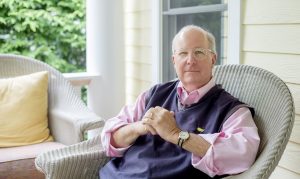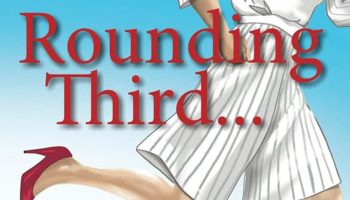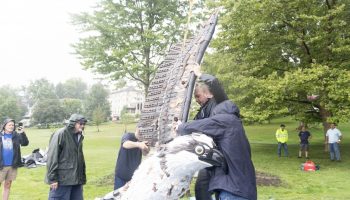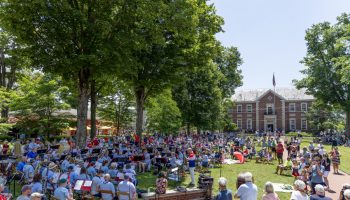
After a decade-and-a-half of service to the Chautauqua community, Chair Jim Pardo is stepping down from the board of trustees
Pardo, a lawyer by trade, first served on the board as a two-year-termed community member of the Asset Policy Committee, then as a trustee for seven years and finally as chair of the board for six.
During his tenure, he oversaw the appointment of the 18th president of Chautauqua Institution; the renewal of the Amphitheater; the pending absorption of the Chautauqua Foundation back into the Institution; and the approval of the 150 Forward strategic plan, for which he served on the working group committee.
Currently, Pardo — along with Institution President Michael E. Hill and Strategic Planning Working Group Chair Laura Currie — is leading a series of Strategic Plan Information Sessions for Chautauquans to engage with 150 Forward.
Pardo will officially vacate his seat in the fall, succeeded by incoming Chair Candy Maxwell on Oct. 1.
How did you discover Chautauqua?
My wife is from Buffalo; we visited her parents when our children were very young and it was a very hot week. … The house wasn’t air conditioned, and as a result, no one in the three generations had a good week.
And I went back to Atlanta, where I was practicing, and one of my partners, who’s a lifetime Chautauquan, asked me how the week went and I told him very candidly that it did not go well. And he said “next year come to Chautauqua.” And so we did; we came over for a day and we were intrigued by it.
We rented a house for the next summer for two weeks — or three weeks, Mary and I don’t remember. … It worked out very well, so we did it the next year, the next year, the next year, the next year. So we went for two to three, three to five, five to six (weeks), like everyone else.
We were introduced to (the Institution) like so many other people — by someone who had found it before — and we found it to our liking, and we started with a small stay and continued to a larger stay and have been here forever.
How has your last season as chair been so far?
Most of the things we were looking to wrap up before the transition to incoming Chair Candy Maxwell have been wrapped up. So, the joke is my duck is lame, and that’s probably a good thing.
But for the rain, this year has been a really remarkable season from a programming standpoint and from a census standpoint.
We had a board meeting last weekend and that went well. We have one more left in my tenure and then we will pass it to Candy and the new leadership.
How have you been preparing for the transition?
The transition is nearly complete. … The selection of Candy was effective in early February. … That allowed Candy and me a couple extra months to just talk on the phone or email back and forth; it allowed President Michael E. Hill to start bringing Candy into some conversations.
The board in its May meeting made it official by electing her Chair Elect, so the formal transition started then.
When you look back on your tenure on the board, what jumps out to you?
The easy and obvious answer you would give to that question in a public setting is the timely completion of the Amphitheater on budget and the return of the community around that without the discord that preceded it — that’s the easy answer.
We chose a new president; we went from Tom Becker, who was an Institution legend, to Michael, who is rapidly becoming an Institution visionary.
I think that the joint decision by Chautauqua Foundation and the Institution to return the development function and development personnel from the Foundation back to the Institution where it sat up until 1991, and allowing increased investments into development efforts without putting a strain on endowment or endowment income, could easily wind up being the most important thing the board did during the tenure that I was on it. That could be a real game-changer up here.
Small things: Easing the alcohol policy to allow the serving of spirits seems to have been received well on the grounds. As we said on the board, we weren’t actually sure what the community reaction would be, but it seems to have been well received.
What I appreciated most — and I say this with all seriousness — there are between 65 and 70 individuals who have been on the board during the 15 years I’ve also been on the board. … When you include spouses and partners and significant others, then suddenly you’re closing in on 150, and if you take the people who were on (auxiliary boards) suddenly you’re in the 200s.
That’s the great benefit that I take away from being on the board — and there are wonderful things that have happened inside the Institution — but from a purely personal standpoint, that’s 200 to 250 new friends that are dear to me.
Is there anything you would redo if you could?
My temperament and demeanor are not always suitable for public consumption. I have a very short fuse when it comes to some issues.
I wish I could take all of those responses back and stuff them back down my mouth and chew on them for awhile and let something more civil come out. You don’t always have that luxury.
But honestly, I think the community has grown with me as I have grown with the community. … I think we have all learned our respective strengths and weaknesses.
Do you have any advice for your successors?
I don’t have any advice for Candy. … She doesn’t need advice from me; she’s going to be a tremendous chair.
What’s your hope for the Institution in the future?
We have such a luxury right now in that we’re not worried about being here tomorrow or next year or five years from now; we have a stable economic base, which allows us to have a more visionary approach to strategic planning.
If we do the things well that we’ve outlined for ourselves in the strategic plan over the next five years and over the next 10 years, then we have the capacity to set the foundation for this place to be here another 150 years. … We’re changing the focus; we’re changing the economic model.
How have you seen Chautauquans engage with the strategic plan?
I think the reaction has been good. … (The Strategic Plan Information Sessions) have been well-attended; the questions have been very good, comments have been very good.
(Data collection for the plan) was so extensive that the executive summary that we received was over 100 pages long. … Once we had the input, everything fell into place. I’d like to tell you it was an onerous process — it was a time consuming job, but it wasn’t an onerous job; it was a lot of fun.
The work product was well received by the board at every instance, and I think, as a result, the final product is being well-received by the community.
What’s next for you personally?
My tennis hopefully will not get any worse. … (We’re) getting a dog.
We will come up here every summer, we’ll enjoy being here with our friends, and we look forward to seeing what Candy and her successors over the years, and Michael and his successors over the years, wind up doing. I think it’s an opportunity for great strides and a lot of good work.




